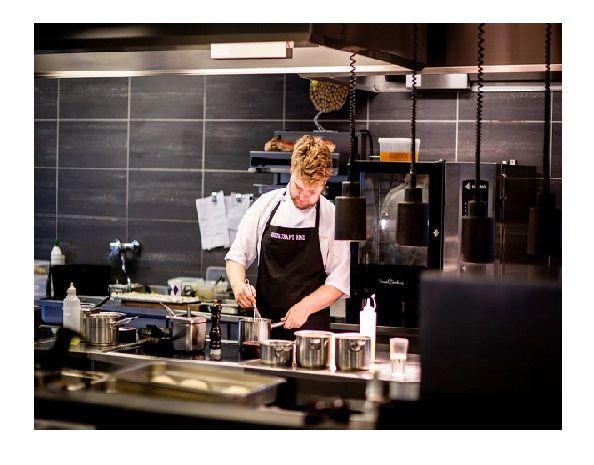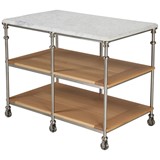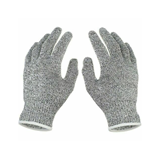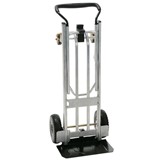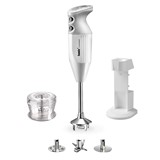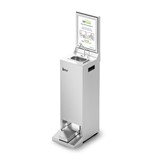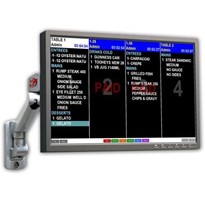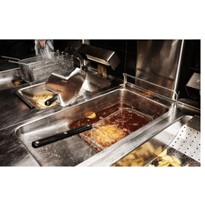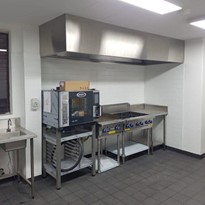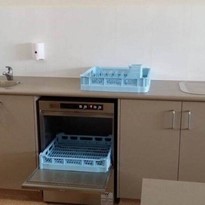It offers an opportunity for advancement while interacting with a broad spectrum of people whom you might not usually meet in your daily work or social life. For those who need to gain valuable industry experience in the Food Industry, working as a kitchen hand can be the answer.
In this article, we delve into the daily duties and responsibilities and take a close look at each of the roles pros and cons.
For those considering a position as a kitchen-hand, we've compiled a list of the most commonly asked questions, they are;
- What does a kitchen hand do?
- Working conditions in a commercial kitchen
- How much does a kitchen hand earn?
- Skills you need to master
- Top chefs who used to be kitchen hands
- Why successful restaurants value their kitchen staff
- How to remain calm while under pressure.
- Staying happy in your work.
For most of us, the title kitchen-hand conjures of images of washing endless piles of dishes in a steaming hot and poorly ventilated kitchen. Thankfully, working in today's commercial kitchens can be a very different and rewarding experience.
What does a kitchen hand do?
The responsibilities and duties of a kitchen hand can vary greatly on experience and the unique needs of the current role.
We've compiled a shortlist of the most common duties and responsibilities of a kitchen hand, they are;
- keep food preparation areas clean
- clean kitchen equipment and appliances
- clean benchtops, floors, ovens and ranges
- receive, lift, handle and store food deliveries
- retrieve food items as requested by chefs
- assist with food preparation
- wash dishes, pots and utensils
- ensure working areas are kept clear
- throw trash out
As you can see from our shortlist, the role involves considerably more than merely dishwashing, but an essential part of the food production process. Kitchen hands must be able to act quickly and independently by developing a keen sense of what needs to be done and at what intervals.
Working conditions in a commercial kitchen
The commercial kitchen environment can be rather harsh. It is hot, steamy and fast-paced, definitely not glamorous work by any stretch of the imagination, and has several hidden dangers such as slips, falls, cuts and splash hazards. In a recent article, we discuss the hidden hazards in the kitchen and how to avoid injuries.
Like all other kitchen staff, the kitchen-hand will spend the majority of the day on their feet. You will need to be physically healthy and generally active to keep up with the demands of the job with many shifts extending beyond 8 hours.
As the kitchen hand is responsible for keeping the kitchen ship-shape, they tend to be the first to arrive and last to leave to ensure the kitchen is ready for the following shift.
Depending on the opening hours of your employer's restaurant, you may be required to work early mornings, lunch or for evening meals and weekend work so rostered rotating shifts are the norm.
How much does a kitchen hand earn?
In Australia, the average weekly wage for a kitchen-hand is around $850 per week, but expect that figure to vary depending on the day and time you work. Kitchen hands, in particular, often work more than 37.5 hours per week. How much you earn will depend on the restaurant you work for, the value you provide, and how well you are valued.
When starting out its best to focus on honing your skill-set by broadening your knowledge of kitchen operations rather than focusing on money. This strategy will prove your worth as a kitchen hand, or if you have aspirations of becoming a kitchen manager or chef.
Skills you need to master to become a kitchen hand.
As with any role, your ability to do the job and your work ethic dramatically improve your chances of success. Some skills and attributes which enhance the likelihood of employment are;
- Certificate in Kitchen Operation
- Excellent communication skills
- Pleasant, cooperative nature
- Flexibility to work shifts or overtime.
Once you have secured your role, it's crucial to leverage your position by continuing to develop and further hone your skill-set. Keep up-to-date with news and tips from industry professionals to further expand your knowledge. Ask questions, learn from your peers at every opportunity.
Top chefs who started out as kitchen hands.
You may also be interested to know that several top chefs started out as kitchen hands in their early years and will attest to the benefits, here are just a few;
- Anthony Bordain - started out washing dishes
- Aaron Turner - started as a kitchen hand (IGNI Geelong)
- Richard Purdue - started out washing dishes
- Dan Hong - started as a kitchen hand at his mother's Vietnamese restaurant
- Ben O'Donoghue - started as a kitchen hand
Why successful restaurants value their kitchen staff
It's been said that if you can withstand the fast-pace of the kitchen and the stress which comes with the role you can handle just about anything. The kitchen hand is the go-getter and expected to know where everything is located, handle and store deliveries, fetch, clean and even assist with food preparation as required.
A kitchen hand's ability to handle the day-to-day responsibilities and problems as they arise will significantly impact on the success of a restaurant. For those who manage to absorb the wealth of knowledge required to balance the day-to-day kitchen operations without throwing in the towel become a truly valued member of the team.
How to remain calm while under pressure
Being able to remain calm while under pressure is crucial when working in fast-paced work environments. Kitchen-hands especially are subject to considerable stress during their daily work schedules.
The majority of experienced kitchen hands juggle regular duties effortlessly, however, find it challenging when asked to carry extra workload brought about by unforeseen circumstances.
So to help you cope with those unexpected interruptions to your workday we've compiled a list of tips on how to remain calm while under pressure, they are;
- Have a regular daily routine
- Stay focused on what needs to be done
- Break large tasks into smaller ones
- Do not dwell on negative things
- Don't be afraid to ask for help
- Focus on helping others
- Take regular breaks
- Limit caffeine intake
- Stay hydrated.
By applying these simple strategies to your workday will help you greatly to remain focused on each and every task. Your ability to rise to the occasion and meet the needs each day presents helps cement your place and value in the kitchen.
Staying happy at work
We have all experienced a time in our working career when our work begins to lose the lustre it once had. All too often, we are quick to lay the blame on others within the organisation rather than consider our dissatisfaction may be a reflection of our own inability to regulate our work-life balance. So if your job has become increasingly tedious of late, it may well be time to look a little closer how you work and relax.
- Plan your workday
- Ask how you can help others
- Avoid toxicity in the workplace
- Do not overburden yourself
- Leave your personal problems at home
- Get regular exercise
- Build interests outside of work
- Work should improve not overwhelm our lives
- Treat others as you expect to be treated
- Get plenty of rest
Final thoughts
There comes a time in everyone's life, no matter what course we pursue in our careers, we all end up wondering if the path we chose was the right choice. I don't think anyone wakes up one morning with the revelation of pursuing the role of kitchen-hand.
You see, the kitchen-hand is one of many service jobs where regardless of the high level of compliance required you will be unlikely to receive any gratitude from whom you serve.
Fortunately, this does not mean the role of the kitchen hand is a thankless one. To the contrary, the role of the kitchen hand is one of the most valued positions in the commercial kitchen today, second only to the chef.


